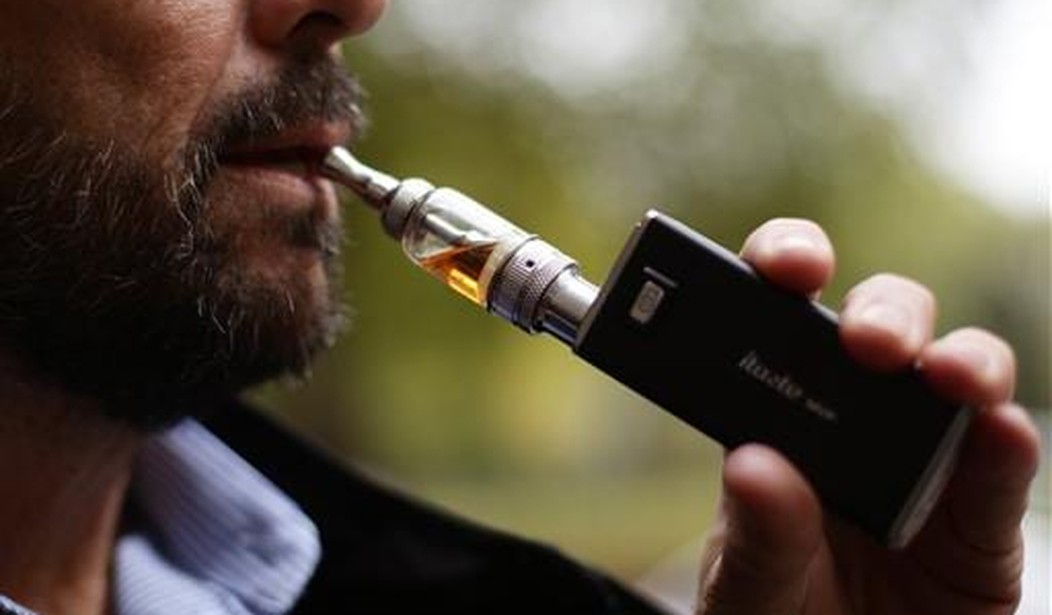Last week, the government’s nannies at the Food and Drug Administration unloaded 499 pages of new regulations on the tobacco industry and tossed in some business-killing regulations for the e-cigarette market as well. E-cigarettes have nothing to do with tobacco, as they do not contain any tobacco. But that did not stop the FDA from trying to regulate the industry out of existence.
The proper agency to regulate nicotine is the Center for Drug Regulation and Research (one of the many tentacles of the FDA), which regulates all the other nicotine products that are bought and sold. Why the Center for Tobacco Products is regulating e-cigs is anyone’s guess. One reason the FDA as an agency is aggressively regulating the e-cig industry might be because the head of the FDA was formerly a Big Pharma lobbyist, actually a lobbyist for, among others, Glaxo Smith Kline, which makes nicotine-replacement drugs. And vaping is a nicotine-replacement product that is not owned by the Big Pharma industry. In other words, the head of the FDA used to lobby for the vaping industry’s primary competitor.
The FDA’s new regulations require e-cig companies to engage in a prohibitively expensive application process for all their products, called the Premarket Tobacco Application process (PMTA). The process will include 1,700 hours of paperwork.
Each and every e-juice product, the liquid that is used to vape, must be tested in every vaping device at every conceivable level and configuration. The cost is estimated to be around $2 million to $10 million per product. How are small businesses supposed to afford that? How is any company expected to afford that? There are hundreds of different flavors and nicotine levels offered for sale. The cost will be astronomical for the little mom and pop shops or small businesses that comprise most of the vaping industry.
The American Vaping Association described the process as “downright prohibition,” and history has shown us how prohibition plays out.
“With the thread of tens of thousands of vape shops potential closing their doors and most manufacturers calling it quits, the millions of people in the US that vape are stuck between giving up their vice or ‘moving underground,’” said White Clouds Vaping in a press release.
“We were expecting to see this industry move from the retail store to home-mixing, but we were surprised how quickly it happened. There are thousands of people that are about to lose their job or their business from their regulations and its sad to see how much innovation is being ‘bullied’ out of business.”
The consequences of the FDA’s regulations are clear.
A survey of vapers shows exactly what they are prepared to do in response to the new regulations. A poll conducted by The Consumer Advocates for Smoke-free Alternatives questioned 20,000 vapers at the end of last year. “More than 90 percent said they would turn to the black market, overseas or homemade products” if they were unable to access e-cig products on the open market.
The survey also found that “more than one-fifth of vapers who’ve already quit responded they would turn back to cigarettes and the 46 percent who still smoke would increase the amount they smoke.” How does the government square these results with its efforts to get people to quit smoking?
Greg Conley, president of the American Vaping Association, told PJ Media that the industry is still fighting back against the regulations.
The bi-partisan Cole-Bishop amendment to the Agriculture appropriations bill sponsored by Tom Cole (R-OK) and Rep. Sanford Bishop (D-GA) has passed the Appropriations Committee in the House. “If this amendment becomes law, any nicotine-containing e-vapor products on the market as of the effective date of the final rule would be grandfathered and, although such products would still have to comply with the rest of the Tobacco Control Act, could avoid the lengthy and expensive PMTA process. Grandfathered products could also serve as predicate products for future SE Reports for new products intended to be marketed after the new grandfather date.”
Both the entire House and the Senate will have to vote on the bill and President Obama will have to sign it.








Join the conversation as a VIP Member